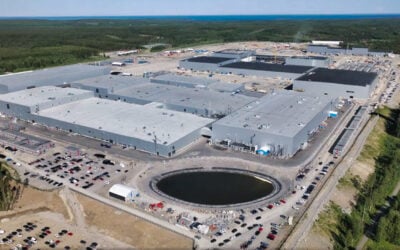
Switzerland-based renewable energy firm Axpo has acquired its second energy storage development in Sweden, a co-located project with 25MW of energy storage.
The state-owned power producer has agreed to acquire and finance the solar and storage project in Filipstad, Värmland County, from Sustainable Energy Solutions Sweden Holding AB (SENS).
It will pair up to 20MW of solar PV and a 25MW battery energy storage system (BESS) although the companies have not revealed the energy storage capacity (MWh).
The payment from Axpo to SENS will be distributed across various milestones up until the project reaches reached ready-to-build status, with the first happening yesterday (15 May).
Try Premium for just $1
- Full premium access for the first month at only $1
- Converts to an annual rate after 30 days unless cancelled
- Cancel anytime during the trial period
Premium Benefits
- Expert industry analysis and interviews
- Digital access to PV Tech Power journal
- Exclusive event discounts
Or get the full Premium subscription right away
Or continue reading this article for free
The companies didn’t say when they expected the project to come online but SENS said in January this year that it expected construction to start in the second half of 2023.
Frank Amend, Head of Batteries & Hybrid Systems, Axpo Group, said: “We are acquiring two important projects from SENS, which we will be able to co-develop from here. Battery storage systems and solar energy will become increasingly important in the power mix in the future. We look forward to further cooperation with our colleagues from SENS in Sweden.”
SENS said the “the total deal value substantially exceeds the deemed amount of SENS’ annual operating costs, provided SENS’ burn rate as of today”, and would help the firm push forward the development of its pumped hydro energy storage (PHES) projects. SENS’ ‘operating expenses’ in 2022 were around 42 million SEK (U$4 million or €3.7 million).
It is Axpo’s second project in Sweden, after it acquired a 20MW/20MWh project in March this year, set to come online in 2024.
The country’s grid-scale market is seeing a swathe of new projects come online as its need for grid balancing grows and its hydropower portfolio, which has historically provided that balancing, begins to be displaced by batteries.
Developer Ingrid Capacity recently secured a US$100 million investment commitment from the battery storage subsidiary of maritime company BW Group for its 400MWh pipeline of projects. Ingrid’s chief strategy officer discussed the Swedish market in an interview with Energy-Storage.news at the Energy Storage Summit in London in February.





